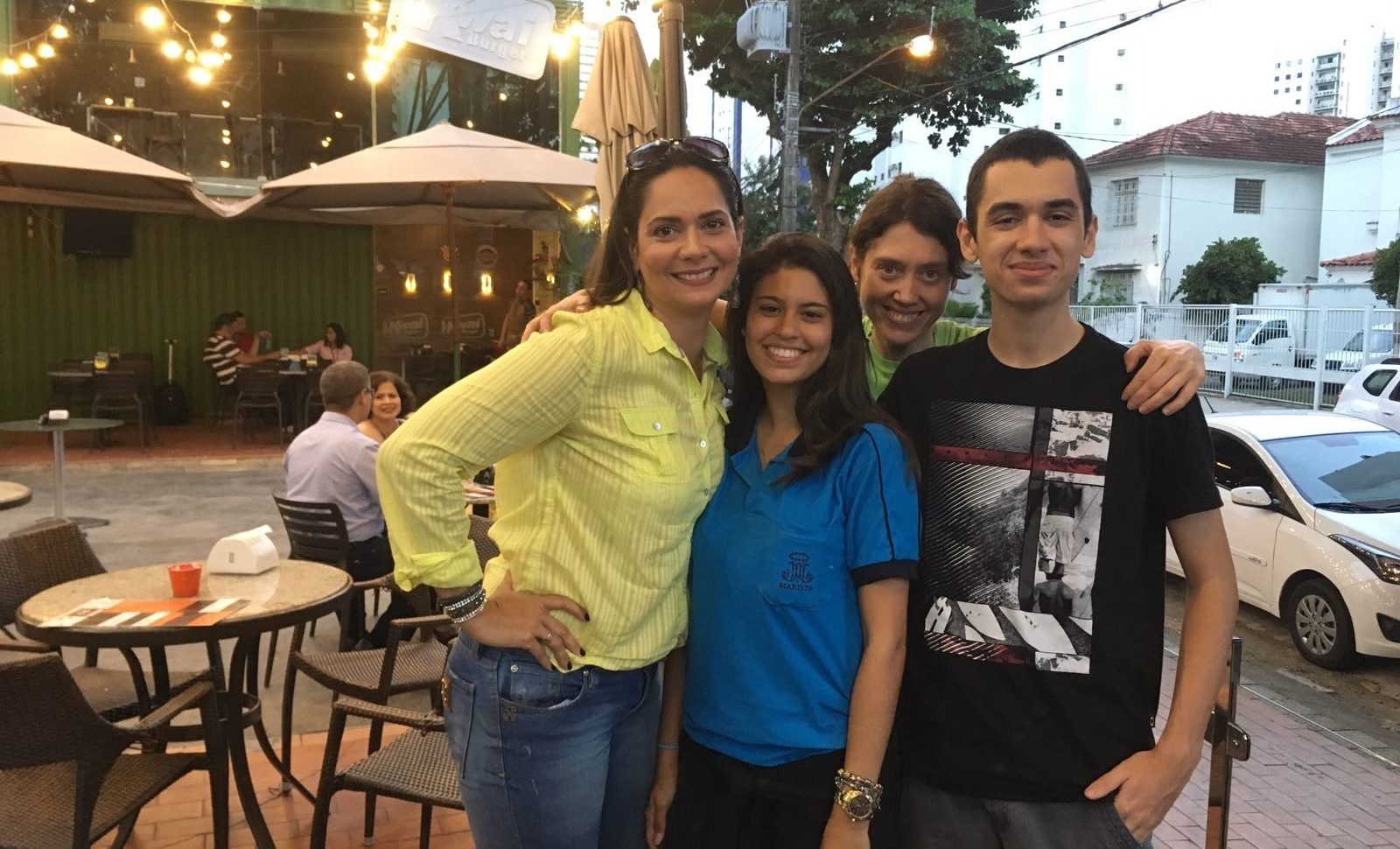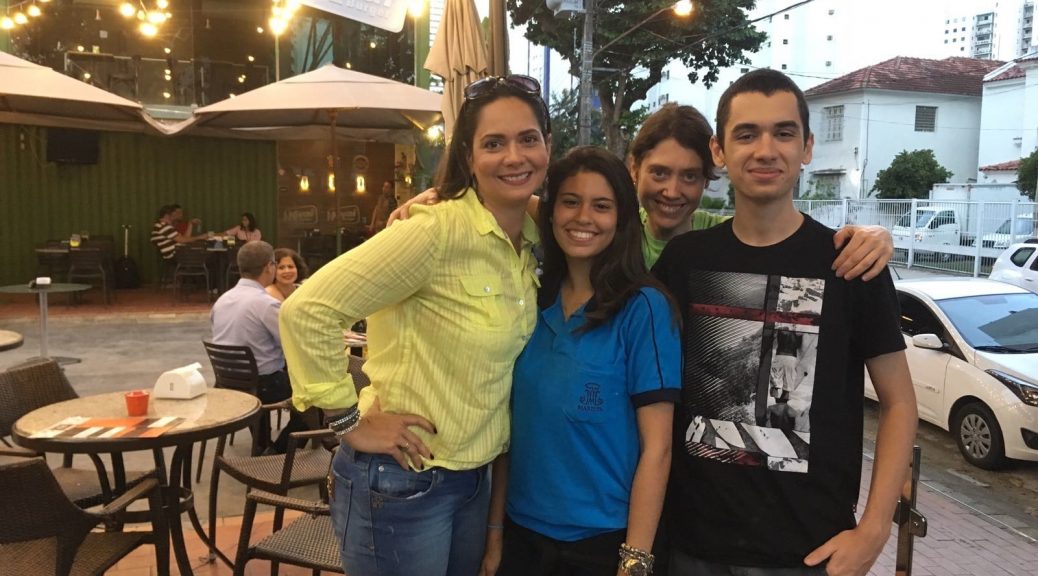Reaching the hand of friendship around the world
Which good causes are you most interested in?
Is it the protection of the environment? Is it helping the poorest in society? Is it medical research? Is it something completely different?
Part of becoming a global citizen is understanding the problems of people on the other side of the world. Every country around the world has its problems. Last month, when we were in Brazil, we took the opportunity to ask Brazilian students to write reports advising us which Brazilian ‘good cause’ they thought most needed the support of More Than English students this summer.
The winning report was by Maria Luiza Oliveira Neves advocating support for Instituto Nossa Senhora de Fatima (INSF). Read her report below. Which good cause does she suggest?
Report To: the Head teacher From: Maria Luiza Oliveira Neves Subject: good causes in Brazil Date: 27-03-2017 Background: The purpose of this report is to discuss about two good causes in Brazil and help the head teacher choose one to raise money for. Fighting for the future The world known favelas in Brazil are a set of poorly built dwellings that do not have full access to security and sewage treatment. There are millions of children without the proper education they need. In order to change that, the institution ‘’INSF - Instituto Nossa Senhora de Fátima’’ works on the development of children’s participation in society, through socio-educational activities, such as choir singing, theatre, sports and computer classes. In addition to that, they try to restore and strengthen family ties as well as rescue citizenship. However, to do so, INSF needs all the financial help they can get, to afford the educators, pedagogical professionals, supplies and cleaning materials. They are a non-profit religious institute trying their best to change a, believed to be, inevitable severe fate of these infants. Donating to this cause would definitely have a positive impact on the course of hundreds of children’s lives, taking them out of complete misery and giving them a priceless gift: hope. Defending life As for the reality of the people who have a drug addiction in Brazil, there is a non-profit social institute called ‘’Manassés’’, the main goal of which is to recover young people from the underworld of drugs. The residents go through a process of rehabilitation, recovery and social reinstatement, with safe methods for treatment. It is outrageous the amount of consequences the use of narcotics can bring, specially for those who are not economically stable in society. Knowing that, Manassés works with a 2-phased treatment, during approximately 9 months, and group activities. In terms of financial hurdles, they depend entirely on donations, so donating to this institute would bring back the lost lives of so many young people who are just starting their journey on this world. Supporting this cause means supporting the idea of finally having a society where the drugs are not sought to solve problems and we would all prosper in better conditions of life. Summary and recommendation Faced with two big issues, like the poverty inserted in Brazilian families and drug addiction situations, it is left an ultimate final question: which one would need more help, which one we should donate for? The answer to that is that both of them are equally urgent and equally needs attention, as well as compassion. However, seeing it from another perspective shows that children neglected from education would probably attract more donations. Narcotic addictions are, indeed, a chain of problems that can not be ignored, but providing education is the first step to accomplish a future fair and developed society. I would recommend choosing INSF to donate money for because of what they are doing to the future of these children and the future of our country – possibly our world.
Questions
- Who does Instituto Nossa Senhora de Fatima (INSF) help?
- Did you agree with Maria’s reasons for supporting INSF?
- Imagine how much INSEF changes people’s lives.
Why we chose Maria’s report
The reason that Maria’s report was so persuasive was a combination of the level of detail and the emotional engagement of the reader caused by use of short emotive phrases. A great example of this is when Maria summarised her reasons for supporting Instituto Nossa Senhora de Fatima (INSF) by saying that it would give “a priceless gift: hope.” Maria’s report got our attention through excellent presentation of facts and through an appeal to our emotions.
More good causes
Here are some of the other things we learnt from other Brazilian teenagers about good causes in Brazil:
In her report, Victoria Lima wrote about the water crisis in Northern Brazil and a consequent 60% reduction in the number of crops planted.
Juliana Soares Borba put forward an argument that the key issue to tackle is extreme poverty focusing especially on the homeless.
Geovanna Vasconcelos focused on health provision, but challenged the idea that lack of money is the cause of problems blaming corruption instead.
Julia Vasconcelos identified Brazil’s rich inheritance in natural resources and raw materials and lamented the waste of potential that results when homeless children do not receive the education they deserve.
Linked to this, Tom Alvin described a mobile programme designed to help children called the Criança Esperança Programme and advocated support for SOS Children’s Villages which fosters orphan children.
Lunna Rayna outlined the work of Bola Pra Frente which uses the power of sport to teach children and teenagers who are exposed to criminality to become contributing citizens. However, she threw her support behind the 100% Animais Institute which supports animals that have been trafficked or deprived of their natural habitat.
Joao Felipe revealed the work of a wonderful charity called Casa do Amor which provides a stimulating environment for the elderly. Finally though, he gave priority to IMIP, a cancer hospital with limited funds.
Aleanna Lira underlined the importance of education in addressing inequality and warned against ignoring problems which left unsolved will “snowball”.
Social justice
If you are a teacher interested in whether English teaching and social justice should be combined, we highly recommend this lecture by the JJ Wilson at this April’s IATEFL Conference in Glasgow.
Special thanks to some very special teachers in Brazil
- Renata Campos
- Marilson
- Israel Maciel



